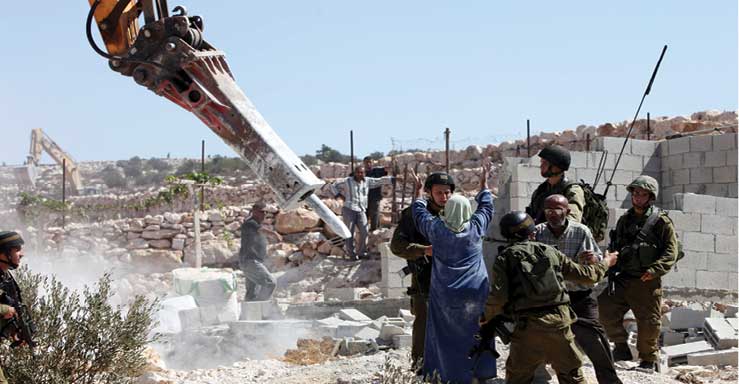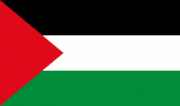
In 2016, we submitted to the UN Mechanisms 9 communications regarding 5 individuals.

PALESTINE
 Our Concerns
Our Concerns
- Arbitrary detention of Palestinians by Israeli authorities, particularly in the form of excessive use of administrative detention, including as a measure to silence any dissent;
- Use of torture and arbitrary detention against minors as young as 12 years old;
- Steady increase in the number of punitive house demolitions;
- Widespread practice of torture;
- Crackdown on freedom of expression by the Palestinian Authority.
 Recommendations
Recommendations
- To Israel:
- Release all minors arbitrarily detained and amend the repressive legislation used against them;
- Ensure that persons held in administrative detention are either released or subjected to a fair judicial procedure without delay;
- Put an end to the policy of punitive house demolitions against Palestinians.
- To Palestine:
- Refrain from the use of torture or ill-treatment against persons arrested or detained;
- Ensure that all those standing trial are guaranteed the right to a fair trial;
- Put an end to the harassment of journalists and critics of the authorities and guarantee the right to freedom of peaceful assembly.
 Upcoming
Upcoming
- Palestinian municipal elections;
- 2 May 2017: Two-year delay in the submission of Palestine’s initial report to the Committee against Torture;
- 2 July 2017: Two-year delay in the submission of Palestine’s initial report to the Human Rights Committee.
The year 2016 began with the UN Special Rapporteur on the situation of human rights in the Palestinian Territory occupied since 1967, Makarim Wibisono, announcing his resignation. In doing so, he explained that throughout his mandate, Israel had failed to grant him access to the Occupied Palestinian Territory (OPT) and expressed his concern over the lack of effective protection for Palestinian victims from continuing violations of human rights and international humanitarian law.
This year, the stalemate in negotiations between Israel and Palestine continued, after Israel’s Prime Minister Benjamin Netanyahu rejected the French “Middle East Peace Initiative” launched in June of this year. On 23 December, the UN Security Council adopted Resolution 2334, demanding an immediate end to all settlement activities by Israel in the OPT. The resolution also called for immediate steps to prevent all acts of violence against civilians, as well as all acts of provocation and destruction. It further called for accountability in that regard and urged both parties to act in compliance with its obligations under international law. The Israeli government strongly rejected the resolution, affirming it would not abide by its terms and “reduce” ties with countries that supported the text.
On the political level, on 8 September 2016, the Palestinian High Court in Ramallah suspended the municipal elections in the West Bank and the Gaza Strip scheduled for 8 October, due to the inability to hold the vote in East Jerusalem and disputes between Fatah and Hamas over candidate lists. The elections, which are anticipated in 2017, will be the first to be held in all of the Palestinian territories since 2007.
The spiral of violence that began in September 2015, following clashes at the Esplanade of the Mosques, continued, with a total of 105 Palestinian and 13 Israeli fatalities in 2016, according to the UN Office for the Coordination of Humanitarian Affairs in the OPT. In June, four Israelis were killed in a gun attack in Tel Aviv, to which the authorities responded by cancelling 83,000 permits granted to West Bank and Gaza residents which would have allowed them to travel during Ramadan, as well as the suspension of approximately 200 work permits belonging to family members of the alleged attackers. The UN High Commissioner for Human Rights qualified these actions as “collective punishment” which he feared would “only increase the sense of injustice and frustration felt by Palestinians”.
Lastly, in the context of a trend to undermine civil society space in Israel, on 11 July 2016, the Knesset voted in favour of the NGO Law. The latter is said to aim at increasing transparency by requiring NGOs that receive more than half of their funding from foreign government entities to disclose certain information, including the names of their donors, for example. The Law was adopted despite three UN experts expressing grave concern that the legislation would “chill the speech of human rights NGOs by subjecting them to harsh penalties for violations and delegitimizing them publicly”.

Torture and arbitrary detention of minors by Israel
In August 2016, Israeli lawmakers approved the “Youth Bill”, authorising the imprisonment of children as young as 12 years old for terrorist offences. The Parliament affirmed that attacks in recent months demanded “a more aggressive approach, including toward minors”. The law will apply mostly to Palestinian children in occupied East Jerusalem, since the emergency military law applicable in the occupied West Bank already allows for the imprisonment of children.
Alkarama documented several cases of torture and imprisonment of children and adolescents, including administrative detention, a measure against minors that has risen steadily since late 2015. Dima Al Wawi, a 12-year-old Palestinian student from Hebron whose case Alkarama referred to the UN Special Procedures, was among these victims. On 18 February 2016, the Israeli Ofer Court sentenced her to four and a half months in prison for “carrying a knife in her backpack, attempting to kill Israeli settlers and threatening Israel’s security”.
Furthermore, on 21 April 2016, the Working Group on Arbitrary Detention (WGAD), seized by Alkarama, adopted an Opinion on the case of Mohammed Mahdi Saleh Suleiman, a Palestinian teenager from Hares, West Bank, who was sentenced to 15 years in prison by a military court for “throwing stones”. In the decision, the UN experts qualified his detention as both “discriminatory” and “arbitrary”, calling upon Israel to secure Mohammed’s immediate release.
In May 2016, following the review of Israel by the Committee against Torture, the UN experts expressed concern over the fact that Palestinian minors continued to be exposed to torture and ill-treatment, including for the purpose of obtaining confessions during interrogations conducted in the absence of a lawyer or a family member. According to several NGOs, as of April 2016, more than 400 Palestinian minors were held in Israeli prisons..

Abusive use of administrative detention against Palestinians
This year again, Palestinians held in Israeli detention facilities saw their most basic rights violated: hundreds were held in administrative detention, without ever being indicted or tried. Although international law stipulates that it may be exercised only in exceptional cases, Israeli authorities have routinely resorted to administrative detention to punish and control the Palestinian population. As such, it allows suspects to be held for renewable six-month periods without trial, often based on “secret evidence”. Moreover, most detainees are not given the opportunity to challenge their detention before an independent judge, their fate left to the discretion of the occupying power’s administration. According to NGO reports, more than 700 Palestinians were held in administrative detention in 2016, the highest number since 2007.
Alkarama notably reported the case of Ali Mustafa Ahmad Hanoon, a blind Palestinian Imam who was released on 11 January 2016, after 20 months in administrative detention. In a similar case handled by Alkarama, on 11 December 2016, after having already spent a year in prison, Palestinian circus performer Mohammed Abu Sakha was ordered to six additional months in administrative detention for allegedly “being a member of an illegal organisation”. Moreover, such abusive recourse to administrative detention is also used in order to shut down any dissenting voice, as was the case of journalist Mohammad Al Qeeq, who was released in May 2016 after six months in prison under the pretext of “inciting violence through the media”.

Torture, arbitrary detention and violations of the freedoms of expression and peaceful assembly by the Palestinian Authority
Despite Palestine’s ratification of the International Covenant on Civil and Political Rights and the Convention against Torture in May 2014, human rights violations persist throughout the country. The practice of torture is widespread, with the Palestinian Independent Commission for Human Rights receiving dozens of complaints of torture and ill-treatment every month, both in the Gaza Strip, controlled by Hamas, and in the West Bank. Moreover, numerous cases of arbitrary detention were registered in 2016, including those arising from the refusal to implement court rulings or acquittal of detainees, or detentions ordered by the governor on political grounds.
In addition, attacks on the freedoms of expression, opinion and peaceful assembly are common in Gaza and the West Bank. This year, several journalists and political activists were harassed, intimidated, and physically abused because of their peaceful criticism of the authorities, including on social media. In some cases in the Gaza Strip, individuals were forced to sign a pledge not to criticise Hamas. Moreover, the crackdown on peaceful protests has also increased: in February, teachers at government schools began a strike calling for their employment rights to be met, leading to the biggest protests in years, which lasted several weeks. The Palestinian Authority security services set up checkpoints, pulled teachers from cars, and prohibited them from entering Ramallah, while forces affiliated with the Fatah party attacked the protesting teachers, accusing them of “stirring up instability”.
